#disruptor records
Explore tagged Tumblr posts
Text
NEKRA, AMANG from the Royal Disruptor e.p. (2020).
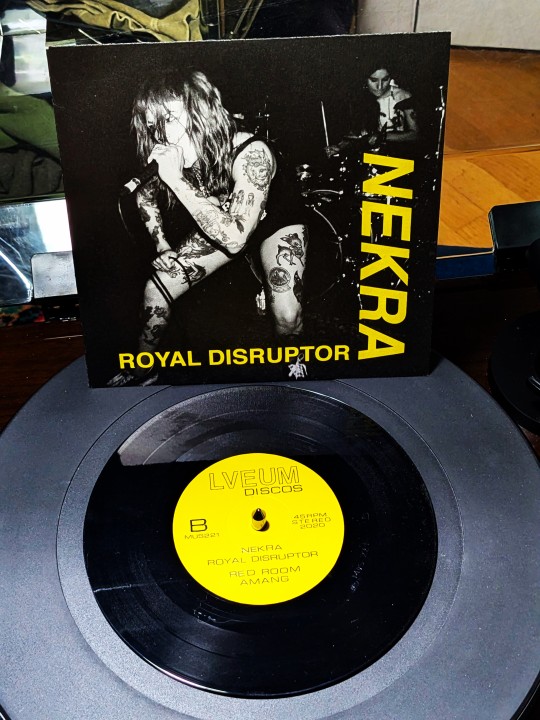
YOU'RE SORRY.
TRY TO RUFFLE MY FEATHERS. RIP ME TO SHREDS. RUIN MY WHOLE FUKING LIFE. TUCK ME INTO BED.
IT'S ALWAYS THE SAME. TIRED EXCUSE. I TRY AND I TRY. WHAT'S THE FUCKING USE.
FIRST THEY BREED. THEN THEY LEAVE.

#nekra#royal disruptor#amang#alexadra graves#kaila stone#paula darias#spooky runo#hardcore punk#femme punk#london#vinyl records#record collection#vinyl collection#punk vinyl#audio post#vinyl rip
11 notes
·
View notes
Text
So I'm an area director at a summer camp, but yesterday my boss called me and asked if I'd be down to be the director of two areas and I said yes without thinking about the consequences. So now I'm the director of two areas? That means two groups of staff to train and lead, two sets of lesson plans, two areas to teach at and make the schedule for and make the lesson plans for, two physical areas to set up. They're right next to each other, but this is going to be fucking insane
#the reason this is happening is because we dont have a dining hall director anymore because the first decided to take summer classes#and the second got a research position. so the director of the area that my area is right next to. volunteered to switch#so the camp director called me yesterday and was like 'this is all happening would you want to take on another area?'#so i would be director of both. with kind of a concentration in the new one. while my assistant director concentrates on the first one#but id still have to lead both staffs. teach at both. be available to both. do records for both. set up both#i start thinking about it and i always realize another thing thats gonna be weird about it#but on the bright side ive decided i cant do the 5 mile hike requirement for my old area#every thursday we do a five mile hike for our class because its for requirements. and i hate it cuz its hard lol#but i realized that it wouldnt really work out for me to be across the lake with one area and leave the other area directorless#so guess i cant do that! oh nooo /s#but i have to make two teaching schedules.whoch i started last night#i have to both teach a suitable amount in both areas but also have enough free time to be flexible and available for both#i am so tired already. and i just got this news yesterday#i was up until 5am because i was planning shit and then i layed awake anxious for another hour#also i watched the disruptors which admittedly got me to stay up pretty late too. the grant obrien and ally Beardsley movie#its very good. but mostly i stayed up late because i was trying to figure out being the director of two areas#i think about it for two seconds and i realize another reason itll be super hard. i have to introduce two staffs at the campfire#i have to talk about two areas at the leaders meeting. i have to learn a whole bundle of new merit badges#im so tired
5 notes
·
View notes
Text
Your Turn to Bear the Burden
summary: one rule for one, and one for another
warnings: a little angsty
a/n: i didn’t exactly stick to the request but it’s close enough !
word count: 1.8k
-
Dinner is sea bass. You have it twice a week because Alexia swears it’s good for the omega-3s, and because she read somewhere that it helps reduce the risk of age related cognitive decline. It’s grilled, seasoned with Maldon sea salt and a drizzle of olive oil from a suspiciously artisanal bottle she brought back from a day trip in Girona. The fish sits on a porcelain plate, beside a scatter of wild rocket (that you suspect isn’t that wild) and a dollop of aioli that she keeps insisting is homemade but always tastes exactly like the jarred one you buy from Mercadona. You don’t complain. You’ve learned not to. Complaining about food in this house would be like complaining about Picasso’s brushstrokes. It’s pointless and makes you look uncultured.
Alexia sits across from you, sleeves rolled to the elbows of her crisp white linen shirt. She’s wearing the Cartier watch you bought her last year, and her hair, damp from her post-training shower, is slicked back with that agonisingly expensive hair product she orders from Paris. Her fork scrapes against her plate in slow, deliberate motions. She eats like someone’s recording her for an advert—perfect posture, elbows off the table, chewing with a rhythm that feels both measured and faintly patronising.
“Eat,” she says, gesturing at your untouched plate. “It’s good for your heart”
“My heart’s fine,” you mutter, stabbing a piece of fish with the fork. It flakes too perfectly, like it’s been carved from soap.
“Your blood pressure says otherwise.” She’s got that look again. The one that makes you feel like she’s your personal physician instead of your wife.
You open your mouth to reply, but then Aina, your six-year-old, decides to detonate the conversational equivalent of an atomic bomb.
“Mami, is the lady at training your girlfriend?”
The question is dropped so casually that, for a moment, you think you’ve misheard. It hangs in the air, heavy and improbable, like a chandelier dangling by a single thread.
Alexia freezes mid-cut of her food, the sharp edge of the knife grazing the plate with a faint squeak that makes you wince. She’s poised in that awkward half-motion, as though still deciding whether to commit to slicing the fish or abandoning the endeavour altogether.
You set your cutlery down with deliberate care. The silver catches the light, refracting it into neat prisms on the table. “I’m sorry,” you say, your voice calm but laced with incredulity. “What?”
“The lady at training,” Aina repeats, savouring her newfound role as household disruptor. She waves a chunk of fish in the air with the authority of a conductor cueing a symphony. “The one with the shiny hair who always laughs at your jokes”
Alexia clears her throat, a sound more purposeful than polite. “Aina, cariño, eat your dinner”
“I am,” Aina replies, affronted, her cheeks puffed with indignation—and probably another piece of food. “But she’s always there. She calls you Ale, too. Like Mamá does”
Your head tilts ever so slightly, your gaze sharpening like the edge of a freshly honed knife. “She calls you Ale?”
“It’s my nickname,” Alexia says, far too quickly. Her knife saws through her sea bass with unnecessary vigour, the motion a little too aggressive for a piece of fish.
“For people who are close,” you murmur, your voice sugared with the faintest trace of menace. Honey over a blade.
“She’s just being friendly,” Alexia mutters, but it’s a hopeless defence. Friendly? Alexia’s version of friendly typically involves curt nods and silences so loaded they could tip over a cargo ship. You’ve seen her reduce overzealous fans to apologetic puddles with nothing more than a well-timed brow lift. This shiny-haired woman must be either extraordinarily resilient or willfully obtuse.
The conversation limps onward—or at least, it pretends to. Aina, blissfully oblivious to the tension, pivots to a monologue about school. There’s a new maths teacher who “smells like raisins,” and the class hamster escaped during art, prompting chaos and a stern lecture from Mrs. Lopez. Alexia seizes this distraction like a lifeline, nodding along with exaggerated interest and lobbing in questions about multiplication tables and papier-mâché volcanoes. But you’re not fooled.
You’re watching her, the cogs in your mind spinning with precision. There’s a tell, you know there is. Something in the way her shoulders stiffen just a fraction too much when Aina says “shiny hair.” The way her hand lingers on her wine glass a moment too long, as if considering the merits of drowning herself in Rioja.
You let it lie for now.
-
Later, when Aina is cocooned in her duvet, her breathing deep and even, you find Alexia in the kitchen. The dishwasher hums faintly as she loads it with the precision of a neurosurgeon mid-surgery. Plates are slotted in at perfect right angles, bowls stacked by diameter like a tidy topographical map, cutlery pointed handle-up because “it’s more hygienic”—a rule she enforces as if it’s in the Geneva Conventions.
You lean against the counter, your stance casual but your tone anything but. “So. The lady with the shiny hair”
Alexia doesn’t look up, focused on positioning a stubborn saucepan. “What about her?”
“Is there something you want to tell me?”
Her exhale is sharp, controlled. She straightens to face you, her expression carefully blank, a masterpiece of denial. “Don’t be ridiculous”
You cross your arms, the picture of patient fury. “I’m not the one making friends at our daughters extra curricular activities”
“She’s not even my friend,” Alexia says, but it’s the wrong thing to say, and she knows it the second it’s out of her mouth. You watch the words hang in the air, a misstep that invites you to pounce. She’s inadvertently handed you the key to a door she didn’t want opened.
“Oh, so she’s just hitting on you,” you say, your tone silky and exact, as if you’re presenting an irrefutable conclusion in court. Your hand cradles the wine glass with a precision that borders on art, its curve mirroring the faint smile playing on your lips.
“Do you hear yourself?” Alexia asks, her voice pitched higher than usual—an octave reserved for complete disbelief.
“Do you hear Aina?” you counter, your words razor-sharp but draped in velvet. “Because she’s clearly picked up on something.”
Alexia exhales, running a hand through her hair in that harried way she does when faced with impossible tactics—like breaking down a parked bus defence or convincing Aina that broccoli isn’t evil. “She’s six. She thinks people are dating if they stand next to each other for more then five minutes”
You raise an eyebrow, arching it with surgical precision. “And yet she’s never accused me of having a girlfriend on my errands”
Alexia hesitates. It’s brief, but you see it—the tiny glitch in her system. Her mouth opens, then closes, her defences recalibrating. She hates this. She thrives on control, on certainty, on organising chaos into perfect diagonal lines, whether it’s her wardrobe or your shared holiday schedules. Being put on the defensive is an alien sensation, and she wears it badly.
“It’s not what you think,” she says finally.
“Great,” you reply, folding your arms. “Because I’m not thinking anything. Yet.”
Alexia exhales through her nose, the kind of exhale that says she’s already tired of this conversation, even though it’s barely started. “She’s a parent of one of the other kids at football. That’s it”
“Right. And the arm-touching?”
“She’s just… tactile”
“Tactile,” you repeat, as if tasting the word for the first time. “Interesting choice of adjective”
Alexia leans forward, her elbows resting on the table—a rare lapse in her usually impeccable posture. “You’re blowing this out of proportion”
“Am I?” You pick up your wine glass and swirl the liquid, not because it needs aerating but because it gives your hands something to do. It’s a Rioja. Medium-bodied. Too warm. “You keep me on a leash so tight I can’t even glance at a waitress without getting a lecture, but shiny hair can play patty-cake with your arm, and I’m the one who’s out of line?”
“She’s not playing patty-cake”
“You’re right. That would require both hands”
“Stop it”
“Why? Is it making you uncomfortable?”
Alexia’s eyes narrow. She doesn’t answer right away, which is unusual for her. She’s usually quick with her rebuttals—sharp, precise, like the lawyer she secretly wishes she’d become. But now, she’s uncharacteristically quiet.
“She’s just being friendly,” Alexia says finally, her voice lower now, almost defensive. “You know how people are”
“No, I don’t. Enlighten me.” You lean forward, resting your chin on your hand. “Because the people I know don’t make a habit of fondling married women during football training”
“Fondling?” Alexia’s eyebrows shoot up. “Now who’s being dramatic?”
“Oh, I’m sorry,” you say, setting your wine glass down with enough force to make the liquid slosh over the rim. “Would you prefer ‘caressing’? Or maybe ‘groping’? No, wait, I’ve got it—‘inappropriate physical contact.’ How’s that for a euphemism?”
Alexia sighs, pinching the bridge of her nose. “You’re paranoid”
“And you’re a hypocrite”
That lands. You can tell by the way her jaw tightens, the muscles working under her skin like she’s chewing on something bitter. You let the silence stretch out, savouring it like the last bite of dessert. When she finally speaks, her voice is quieter, but no less sharp.
“What do you want me to say?” she asks. “That I’ll tell her to stop? Fine. I’ll tell her to stop. Happy?”
“No.” You shake your head. “Because that’s not the point
“Then what is the point?”
“The point,” you say, your voice rising now, “is that you don’t get to police my every interaction and then brush this off like it’s nothing. You don’t get to play the saint while shiny hair out there auditioning for Handsy Football Mums Gone Wild”
Alexia’s lips press into a thin line. For a moment, you think she might yell, but she doesn’t. She just sits there, staring at you with those infuriatingly steady eyes, like she’s trying to dissect you with her gaze alone.
“She’s not interested in me,” Alexia says eventually, her tone measured, controlled. “She’s just… like that. With everyone”
“Do you actually believe that,” you ask, “or are you just hoping I will?”
She doesn’t answer. And for the first time tonight, you feel like you’ve won—not the argument, necessarily, but something. A crack in her armour, maybe. Or a shift in the balance of power.
“Don’t look at me like that,” Alexia says finally, her voice quieter now. Almost vulnerable.
“Like what?”
“Like you don’t trust me,
You don’t answer right away. Instead, you pick up your wine glass again, taking a long, slow sip. The wine tastes better now. Richer. Fuller. Or maybe that’s just the satisfaction of knowing you’ve rattled her.
“It’s not about trust,” you say eventually, setting the glass back down. “It’s about consistency”
Alexia tilts her head, confused. “Consistency?”
“If you’re going to be the morality police,” you say, your tone light but cutting, “you’d better make sure you’re following your own rules. Otherwise, it’s just embarrassing”
She doesn’t reply. And for the first time all evening, you think maybe—just maybe—she’s out of things to say.
#alexia putellas#alexia putellas x reader#fcb femeni#fcb femeni x reader#espwnt#espwnt x reader#woso#woso x reader#woso imagine#woso community
551 notes
·
View notes
Text
Gandersauce

I'm on a 20+ city book tour for<p>placehold://://er </p> my new novel PICKS AND SHOVELS. Catch me in AUSTIN on MONDAY (Mar 10). I'm also appearing at SXSW and at many events around town, for Creative Commons and Fediverse House. More tour dates here.

It's true that capitalists by and large hate capitalism – given their druthers, entrepreneurs would like to attain a perch from which they get to set prices and wages and need not fear competitors. A market where everything is up for grabs is great – if you're the one doing the grabbing. Less so if you're the one whose profits, customers and workers are being grabbed at.
But while all capitalists hate all capitalism, a specific subset of capitalists really, really hate a specific kind of capitalism. The capitalists who hate capitalism the most are Big Tech bosses, and the capitalism they hate the most is techno-capitalism. Specifically, the techno-capitalism of the first decade of this century – the move fast/break things capitalism, the beg forgiveness, not permission capitalism, the blitzscaling capitalism.
The capitalism tech bosses hate most of all is disruptive capitalism, where a single technological intervention, often made by low-resourced individuals or small groups, can upend whole industries. That kind of disruption is only fun when you're the disruptor, but it's no fun for the disruptees.
Jeff Bezos's founding mantra for Amazon was "your margin is my opportunity." This is a classic disruption story: I'm willing to take a smaller profit than the established players in the industry. My lower prices will let me poach their customers, so I grow quickly and find more opportunities to cut margins but make it up in volume. Bezos described this as a flywheel that would spin faster and faster, rolling up more and more industries. It worked!
https://techcrunch.com/2016/09/10/at-amazon-the-flywheel-effect-drives-innovation/
The point of that flywheel wasn't the low prices, of course. Amazon is a paperclip-maximizing artificial intelligence, and the paperclip it wants to maximize is profits, and the path to maximum profits is to charge infinity dollars for things that cost you zero dollars. Infinite prices and nonexistent wages are Amazon's twin pole-stars. Amazon warehouse workers don't have to be injured at three times the industry average, but maiming workers is cheaper than keeping them in good health. Once Amazon vanquished its competitors and captured the majority of US consumers, it raised prices, and used its market dominance to force everyone else to raise their prices, too. Call it "bezosflation":
https://pluralistic.net/2023/04/25/greedflation/#commissar-bezos
We could disrupt Amazon in lots of ways. We could scrape all of Amazon's "ASIN" identifiers and make browser plugins that let local sellers advertise when they have stock of the things you're about to buy on Amazon:
https://pluralistic.net/2022/07/10/view-a-sku/
We could hack the apps that monitor Amazon drivers, from their maneuvers to their eyeballs, so drivers had more autonomy and their bosses couldn't punish them for prioritizing their health and economic wellbeing over Amazon's. An Amazon delivery app mod could even let drivers earn extra money by delivering for Amazon's rivals while they're on their routes:
https://pluralistic.net/2023/04/12/algorithmic-wage-discrimination/#fishers-of-men
We could sell Amazon customers virtual PVRs that let them record and keep the shows they like, which would make it easier to quit Prime, and would kill Amazon's sleazy trick of making all the Christmas movies into extra-cost upsells from November to January:
https://www.amazonforum.com/s/question/0D54P00007nmv9XSAQ/why-arent-all-the-christmas-movies-available-through-prime-its-a-pandemic-we-are-stuck-at-home-please-add-the-oldies-but-goodies-to-prime
Rival audiobook stores could sell jailbreaking kits for Audible subscribers who want to move over to a competing audiobook platform, stripping Amazon's DRM off all their purchases and converting the files to play on a non-Amazon app:
https://pluralistic.net/2022/07/25/can-you-hear-me-now/#acx-ripoff
Jeff Bezos's margin could be someone else's opportunity…in theory. But Amazon has cloaked itself – and its apps and offerings – in "digital rights management" wrappers, which cannot be removed or tampered with under pain of huge fines and imprisonment:
https://locusmag.com/2020/09/cory-doctorow-ip/
Amazon loves to disrupt, talking a big game about "free markets and personal liberties" – but let someone attempt to do unto Amazon as Amazon did unto its forebears, and the company will go running to Big Government for a legal bailout, asking the state to enforce its business model:
https://apnews.com/article/washington-post-bezos-opinion-trump-market-liberty-97a7d8113d670ec6e643525fdf9f06de
You'll find this cowardice up and down the tech stack, wherever you look. Apple launched the App Store and the iTunes Store with all kinds of rhetoric about how markets – paying for things, rather than getting them free through ads – would correct the "market distortions." Markets, we were told, would produce superior allocations, thanks to price and demand signals being conveyed through the exchange of money for goods and services.
But Apple will not allow itself to be exposed to market forces. They won't even let independent repair shops compete with their centrally planned, monopoly service programs:
https://pluralistic.net/2022/05/22/apples-cement-overshoes/
Much less allow competitors to create rival app stores that compete for users and apps:
https://pluralistic.net/2024/02/06/spoil-the-bunch/#dma
They won't even refurbishers re-sell parts from phones and laptops that are beyond repair:
https://www.shacknews.com/article/108049/apple-repair-critic-louis-rossmann-takes-on-us-customs-counterfeit-battery-seizure
And they take the position that if you do manage to acquire a donor part from a dead phone or laptop, that it is a felony – under the same DRM laws that keep Amazon's racket intact – to install them in a busted device:
https://www.theverge.com/2024/3/27/24097042/right-to-repair-law-oregon-sb1596-parts-pairing-tina-kotek-signed
"Rip, mix, burn" is great when it's Apple doing the ripping, mixing and burning, but let anyone attempt to return the favor and the company turns crybaby, whining to Customs and Border Patrol and fed cops to protect itself from being done unto as it did.
Should we blame the paperclip-maximizing Slow AI corporations for attempting to escape disruptive capitalism's chaotic vortex? I don't think it matters: I don't deplore this whiny cowardice because it's hypocritical. I hate it because it's a ripoff that screws workers, customers and the environment.
But there is someone I do blame: the governments that pass the IP laws that allow Apple, Google, Amazon, Microsoft and other tech giants shut down anyone who wants to disrupt them. Those governments are supposed to work for us, and yet they passed laws – like Section 1201 of the Digital Millennium Copyright Act – that felonize reverse-engineering, modding and tinkering. These laws create an enshittogenic environment, which produces enshittification:
https://pluralistic.net/2024/05/24/record-scratch/#autoenshittification
Bad enough that the US passed these laws and exposed Americans to the predatory conduct of tech enshittifiers. But then the US Trade Representative went slithering all over the world, insisting that every country the US trades with pass their own versions of the laws, turning their citizens into an all-you-can-steal buffet for US tech gougers:
https://pluralistic.net/2020/07/31/hall-of-famer/#necensuraninadados
This system of global "felony contempt of business-model" statutes came into being because any country that wanted to export to the USA without facing tariffs had to pass a law banning reverse-engineering of tech products in order to get a deal. That's why farmers all over the world can't fix their tractors without paying John Deere hundreds of dollars for each repair the farmer makes to their own tractor:
https://pluralistic.net/2022/05/08/about-those-kill-switched-ukrainian-tractors/
But with Trump imposing tariffs on US trading partners, there is now zero reason to keep those laws on the books around the world, and every reason to get rid of them. Every country could have the kind of disruptors who start a business with just a little capital, aimed directly at the highest margins of these stupidly profitable, S&P500-leading US tech giants, treating those margins as opportunities. They could jailbreak HP printers so they take any ink-cartridge; jailbreak iPhones so they can run any app store; jailbreak tractors so farmers can fix them without paying rent to Deere; jailbreak every make and model of every car so that any mechanic can diagnose and fix it, with compatible parts from any manufacturer. These aren't just nice things to do for the people in your country's borders: they are businesses, massive investment opportunities. The first country that perfects the universal car diagnosing tool will sell one to every mechanic in the world – along with subscriptions that keep up with new cars and new manufacturer software updates. That country could have the relationship to car repairs that Finland had to mobile phones for a decade, when Nokia disrupted the markets of every landline carrier in the world:
https://pluralistic.net/2025/03/03/friedmanite/#oil-crisis-two-point-oh
The US companies that could be disrupted thanks to the Trump tariffs are directly implicated in the rise of Trumpism. Take Tesla: the company's insane valuation is a bet by the markets that Tesla will be able to charge monthly fees for subscription features and one-off fees for software upgrades, which will be wiped out when your car changes hands, triggering a fresh set of payments from the next owner.
That business model is entirely dependent on making it a crime to reverse-engineer and mod a Tesla. A move-fast-and-break-things disruptor who offered mechanics a tool that let them charge $50 (or €50!) to unlock every Tesla feature, forever, could treat Musk's margins as their opportunity – and what an opportunity it would be!
That's how you hurt Musk – not by being performatively aghast at his Nazi salutes. You kick that guy right in the dongle:
https://pluralistic.net/2025/02/26/ursula-franklin/#franklinite
The act of unilaterally intervening in a market, product or sector – that is, "moving fast and breaking things" – is not intrinsically amoral. There's plenty of stuff out there that needs breaking. The problem isn't disruption, per se. Don't weep for the collapse of long-distance telephone calls! The problem comes when the disruptor can declare an end to history, declare themselves to be eternal kings, and block anyone from disrupting them.
If Uber had been able to nuke the entire taxi medallion system – which was dominated by speculators who charged outrageous rents to drivers – and then been smashed by driver co-ops who modded gig-work apps to keep the fares for themselves, that would have been amazing:
https://pluralistic.net/2022/02/21/contra-nihilismum/#the-street-finds-its-own-use-for-things
The problem isn't disruption itself, but rather, the establishment of undisruptable, legally protected monopolies whose crybaby billionaire CEOs never have to face the same treatment they meted out to the incumbents who were on the scene when they were starting out.
We need some disruption! Their margins are your opportunity. It's high time we started moving fast and breaking US Big Tech!
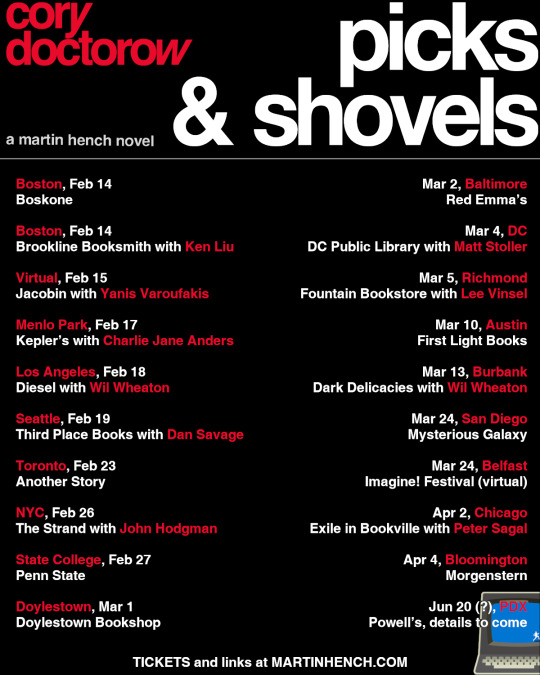
If you'd like an essay-formatted version of this post to read or share, here's a link to it on pluralistic.net, my surveillance-free, ad-free, tracker-free blog:
https://pluralistic.net/2025/03/08/turnabout/#is-fair-play
#pluralistic#move fast and break things#disruption#big tech#monopolism#antitrust#ip#anticircumvention#trumpism#tariffs#your margin is my opportunity
388 notes
·
View notes
Text
DP X Marvel #15
They were never supposed to be real.
Danny wasn’t born; he was built—stitched together in a freezing underground HYDRA lab from the broken DNA strands of James Buchanan Barnes, chosen not for loyalty or legacy but for blood. Something about Winter’s cells held a resilience no other subject had survived, even after decades on ice and countless mental fractures. Danny was Subject 077—barely more than a theory made flesh. A prototype for a new line of enhanced operatives. Something that could endure everything and obey nothing but the cold voice of a handler.
Jazz was worse. She was art. Red Room engineering at its most elegant and most horrifying. A near-perfect clone of Natalia Alianovna Romanoff, born of Black Widow blood but grown under their sharp hands and sharper scalpel. Jazz had beauty, poise, intelligence. But she was also an apex predator molded in ballet and murder, just like her source. She had been created to be the final evolution of Widow. A sleeper. An infiltrator. A masterpiece in patience and destruction.
They were never supposed to meet.
But then Vlad happened.
Dr. Vladimirov Masterov—Vlad Masters—was a ghost in every way that mattered. Once KGB, always KGB. They said he’d died during a failed mission in Chernobyl. He hadn’t. He’d gone half-dead. Half-ghost. A twisted result of an experiment gone wrong, his molecules phasing just enough to slip between states. He’d taken the failure personally, refused to fade. Instead, he rose again in America, as Vlad Masters, eccentric billionaire and corporate ghoul. But behind every charity gala and mayoral campaign was a hunger to perfect the science that had torn him in half.
Vlad had overseen Jazz’s earliest combat assessments. He’d taught Danny how to fire a Glock at age six. His affection was obsessive. Paternal in that twisted, post-Soviet way that smelled like iron and vodka. “You’re my legacy, my little phantoms,” he’d murmur, his gloved hand stroking Danny’s hair, like petting a favorite lab rat. He loved them the way a butcher loves the knife.
Jack Fenton—Jakob Fentzen—was worse. A HYDRA scientist with a permanent manic grin and a knack for building machines that did things no machine should. Quantum destabilizers, molecular disruptors, spectral centrifuges—things that turned flesh to glass and time to mist. He’d been the one to isolate the Winter Soldier’s regenerative traits. He laughed through the process. He called Danny “Champ” while inserting tracking chips into his spinal cord. Danny screamed, once. Jack said it was music.
Maddie—Maja Vuković—was quieter. Colder. Her notes were written in blood and brilliance. She designed Jazz’s conditioning routines. Psychological torment dressed up as ballet recitals and etiquette dinners. Jazz learned to disassociate by age four. “You’re perfect,” She would say, brushing Jazz’s red-gold hair. “Natalia was the draft. You are the final copy.”
And then something went wrong.
It was supposed to be a routine exposure. Just a test of the ghost portal Vlad had constructed in the basement of the Fenton Works facility—a decaying front in the Midwest. But Danny fell in. Or was pushed. Or ran. The records blurred.
And then he came back…wrong.
Cells mutated. Energy readings off the charts. Intangibility. Invisibility. An ectoplasmic core that pulsed like a dying star. Not just an assassin now—an anomaly. A walking ghost. They called it a miracle. Vlad called it divinity. Jack wanted to vivisect him immediately.
Danny refused.
That was the mistake.
They underestimated the side effects of individuality. The ghost powers weren’t part of the program. And with them came emotion, conscience, defiance.
They tried to recondition him. Vlad struck him. Maddie drugged him. Jack built something with screaming blades.
Jazz broke protocol. She slit two guards’ throats with a dining knife and pulled Danny out of the operating room. He was barely conscious, bleeding green and crying. She whispered to him the way Natalia might have whispered to herself in a Red Room dormitory: “We go now. Or we die here.”
They went.
They ran.
For three years, the world forgot about the Fenton kids. Until they didn’t.
The Avengers found out during a HYDRA base raid in Belarus. Steve Rogers opened a data file and dropped it like it burned. Natasha Romanoff stared at Jazz’s image and fell silent for an hour. Bucky Barnes had to be sedated after reading Danny’s file.
“A clone?” Bucky rasped, restrained and shaking. “Of me?”
“HYDRA’s final Winter Soldier prototype,” Bruce murmured. “He’s a ghost. Literally. His molecular structure—”
“I don’t care about his molecules!” Bucky exploded. “He’s just a kid. My fucking kid!”
Steve looked pale. “They’re so young...”
“They’re us,” Natasha said quietly, staring at Jazz’s face on the screen. “Our blood. Our sins. Our ghosts.”
They scrambled, but the trail was cold. Danny and Jazz had buried themselves deep. They moved from safehouse to safehouse, mostly living like rats. Danny phased them through walls, hacked ATMs with his ghost energy. Jazz manipulated human behavior like a maestro. They didn’t speak much. They didn’t have to.
“You okay?” Danny would ask.
“No,” Jazz would say. “But you?”
“No.”
Still, they stayed alive.
Until they slipped up.
It was a gas station. A security camera. A moment of laughter—Danny made Jazz laugh, and her teeth showed. That smile ended everything.
Tony saw it first. “Is that the Fenton girl? She’s…smiling.”
Natasha was on her feet before the footage ended. “Get the quinjet.”
Steve was right behind her. “We find them. Now.”
When they did, it was ugly.
The Avengers cornered them in an abandoned church in Chicago. Danny nearly brought the roof down. Jazz went straight for Natasha’s throat.
“I don’t want to hurt you,” Natasha pleaded, parrying the blade with bare hands.
“Then you’re already weak,” Jazz snarled.
Steve took a punch from Danny that shattered his ribs. Bucky didn’t fight. He just stood there, tears on his face.
“I know what they did to you,” he whispered.
“You don’t,” Danny hissed, half-ghost and glowing. “You don’t know what it’s like to be built to die.”
“I do.” Bucky stepped forward, arms open. “They made me too, and I remember every scream.”
Danny hesitated.
That was enough.
Jazz disarmed Natasha and froze.
“You look like my nightmares,” she whispered. “But quieter.”
“You look like a second chance,” Natasha said, and her voice broke.
That night, the church became a refugee camp.
Tony brought blankets. Bruce brought meds. Steve brought silence. Bucky and Natasha never left their sides.
“Don’t touch me,” Danny had growled at first.
“I won’t,” Bucky said. “I’ll just be here.”
Jazz refused food until Natasha force-fed her soup and whispered lullabies in Russian.
“You’ll kill me eventually,” Jazz muttered.
“No,” Natasha said, brushing her hair. “I’ll love you first.”
It wasn’t easy.
Danny screamed in his sleep, glowing and flailing. Once he phased into the floor and didn’t come back for three hours. Jazz stopped speaking for two weeks. She stared at walls. Cut herself just to feel.
Natasha stitched every wound.
Bucky sat beside Danny and read him books about World War II.
“You’re not him,” Danny said one day. “You’re not my father.”
“No,” Bucky agreed. “But I wish I’d been.”
Steve took them outside. Taught Jazz how to ride a bike. Let Danny fly circles around the compound.
But one day, Vlad showed up again.
He appeared in Danny’s room, phasing through the wall like smoke. “Come home, little badger.”
Danny shrieked and attacked. Vlad didn’t fight.
“I miss you,” he said, bleeding green from his mouth. “They won’t understand you like I do.”
“You’re not real,” Danny screamed. “You never were!”
Jazz shot him in the chest. He smiled.
“Perfect aim. I taught you well.”
He vanished.
After that, they didn’t sleep for a week.
One morning, Danny sat beside Bucky on the roof.
“Do you think I’ll ever be normal?”
“No,” Bucky said honestly. “Though you’ll be loved.”
Jazz, curled in Natasha’s lap, asked, “Was I always going to be a monster?”
“No,” Natasha whispered. “You were always going to be mine.”
They weren’t cured.
They were wreckage.
But they were surviving.
And for now, that was enough.
#danny fenton#danny phantom#dp x marvel#danny phantom fanfiction#marvel mcu#mcu#marvel#mcu fandom#crossover#danny phantom fandom#marvel fandom#marvel fanfic#mcu bucky barnes#bucky barnes#james buchanan barnes#james bucky buchanan barnes#james bucky barnes#natasha romanoff#natasha romanov#natalia alianovna romanova#mcu natasha romanoff#black widow#winter soldier#red room#marvel hydra#jazz fenton#jasmine fenton
253 notes
·
View notes
Text
Blue Lock VS. U-20 JAPAN Serialised Interview, Part 2
Makoto Furukawa as Tabito Karasu – Exploring Karasu’s ‘Calculating Nature’ and ‘Aura of Dominance’
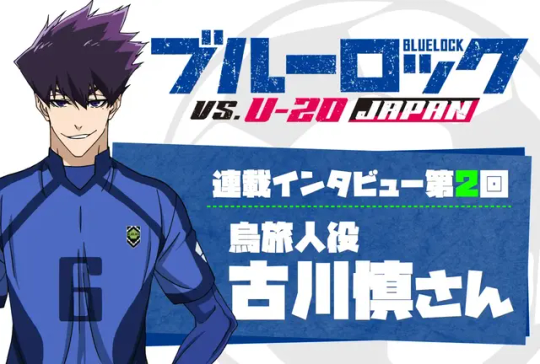
Interviewer: Could you share your thoughts on the story’s focus in Season 2, particularly the "U-20 Japan National Team Match"? What aspects of it do you find most striking or appealing?
Makoto Furukawa (voice of Tabito Karasu): Seeing the individuals who have previously clashed so fiercely now come together as teammates to face the U-20 players has a certain emotional depth to it.
When you think of the U-20 Japan National Team in real life, it’s often seen as a dream team, made up of players selected from across various regions. But in a way, the Blue Lock players are no less of a dream team themselves. This makes for an incredibly thrilling and dynamic development in the story.
Interviewer: What was your first impression of Tabito Karasu as a character, and what do you focus on when portraying him?
M. Furukawa: One of the key directions I received was to emphasise his "calculating nature." I try to incorporate that subtly throughout my performance. While his surname, "Karasu," means "crow," his personality and troublesome nature remind me more of a "snake" a comparison that was also highlighted in the direction I received.
Another important aspect is his Kansai dialect. I was provided with guide audio beforehand, and adapting its nuances to match the character's pace and the visuals was quite challenging. I’ve also had the opportunity to learn from people on set who are from the Kansai region, which has been incredibly helpful and much appreciated.
Interviewer: In Episode 2, we saw Team A face off against Team B in a match to decide the regular players for the "U-20 Japan National Team Match." There was also a scene where Karasu and Kageya Otoya stood together as the team's two forwards. Could you share your impressions of Episode 2 and any scenes that stood out to you?
M. Furukawa: Looking back after recording, I feel that this episode served as an introduction for characters who hadn’t yet had much opportunity to shine in the story. I hoped to convey the "aura of strength" that comes with surviving Blue Lock. In a sense, this episode felt like a self-introduction for many characters, so I hope viewers will continue to support them moving forward.
Interviewer: In this episode, Karasu’s sharp analytical skills and his knack for being a disruptor were on full display, such as when he referred to Isagi as "ordinary." How did you approach these aspects in your performance?
M. Furukawa: I focused on creating the sense that Karasu could "disable" his target player (functionally speaking). By subtly hinting at malice and applying pressure bit by bit, I aimed to build that tension in the performance.
Since I also considered the physical aspects of his character, it’s possible that the sense of pressure came across even stronger than intended.
Interviewer: Lastly, could you share what viewers should look forward to in the coming episodes?
M. Furukawa: As many already know, the match against the U-20 players is a major highlight. However, what excites me most is the personal growth and human drama that unfolds throughout the series it’s truly inspiring.
Personally, I was particularly struck by Ego’s long monologue.
Of course, the individual moments of brilliance from each character are also something to look forward to. Please enjoy the broadcast!
Interview by Chihiro Sasamoto.
Edited by Inari Ogawa.
Translated by isthepame (X)
Source: animateTimes
34 notes
·
View notes
Note
a few quick questions on Machete, what breed is he? I love the angles of his snout and the proportions remind me of a borzoi though I don't think he is one. Also, does he have a set age for when he's a cardinal? I picture him to be around mid-30s or so. Wonderful art! love your stuff and find you an inspiration :)
He's a fictional breed called Podenco Siciliano, which is closely related to modern day Ibizan Hound (pictured below) and other Mediterranean rabbit-hunting podencos. I usually just default to calling him a sighthound since he's somewhat of a provincial mongrel and not meant to be purebred anyway.


As for the age, mid-30s sounds about right. I think the current timeline goes something like this:
0 - Born to a lower-middle class family in Sicily, father is a tradesman, has three older brothers. Generally considered a runt, is weak and sick all the time, parents suspicious of his unusual colors.
3 - Gets left at a monastery and raised by monks as a foundling. Nervous and meek kid, but the monks think he's endearing and do their best to support him. Is taught to read and write, which is a massive advantage at that day and age, and learns rudimentary Latin through exposure.
9 - Apprenticed to a Neapolitan priest, moves to southern part of mainland Italy (or Kingdom of Naples as it was called, it was ruled by Spain actually). Does chores and runs errands in exchange for education and experience.
15 - The priest gets elevated to a bishop and decides to sponsor Machete's further studies at an acclaimed university in Venice (in Northern Italy). There he studies theology, medicine, arts, law, philosophy and gets fluent in Latin and adequate in Greek. Befriends Vasco but their relationship is short-lived.
21 - Ordained a priest. Leads a parish somewhere in Papal States (Central Italy). Is generally well liked but doubts his career choice from time to time.
26 - Becomes a part of the Papal Court in Vatican, mostly because of the recommendations of his former mentor and professors, good reputation, excellent track record and sheer luck. Still a priest but assists bishops, cardinals and the pope himself directly. Moves to Rome. Becomes pope's unofficial confidant due to his obedient and hardworking nature and because of his lack of prestigious family connections that would render him a threat. Slowly starts to gain wealth.
30 - Created a cardinal (which is the second highest position in the church after the pope, and it's at the sole discretion of the pope who becomes one). Is also a bishop as a technicality. Handles administrative jobs, tons of paperwork, at some point he's in charge of a lot of the political correspondence and diplomatic missions. Still the old pope's trusted advisor but disliked by the majority of the cardinals, who see him as an outsider, sycophant and a potential disruptor of the status quo.
34 - Meets Vasco again. Vasco has become a succesful politician in Florence, he's married with three children.
38 - The pope dies and Machete's status falters. He starts to work with the Roman inquisition more. Oversees trials, torture, excommunications and executions of heretics, witches and most of all, protestants (since we're reaching Counter Reformation times and the Vatican is Very Worried about the spread of Luther's ideas). Isn't having a good time at all but keeps up the appearances. Gets infamous. The beginning of the true villain era.
40 - Grows increasingly more disillusioned with life and his ideals, as well as the corruption of the Curia. Burned out, paranoid and desperate. Uses scare tactics, extortion and legal trickery to expose and undermine his enemies, but gains them faster than he can keep up. Employs spies, thugs and assassins. Feared and loathed.
43 - Gets assassinated and dies in disgrace.
#answered#jaydenchapstick#sorry this turned out sorta long#and kinda bummer too#all of this is subject to change if I end up thinking of something better#not set in stone just the current grand picture#the ages are approximate#the history of Italy and the workings of the catholic church are both such clusterfucks holy moly gosh darn#I've done research but don't rely on my word that this is all accurate and feasible in the end it's fantasy rules#whenever you see him wearing any red it's a sign he's at the cardinal phase these positions are color coded like that#Machete
889 notes
·
View notes
Text
Luz and Willow; Problem and Solution
A dichotomy I’ve noticed in Luz and Willow’s arcs and how they converge/parallel in For the Future is that they both struggle with the same basic idea that they shouldn’t ask for help, that they don’t want to be a burden on others. But I think they also operate on opposite sides of a particular premise; Do people need me, am I helpful for them?
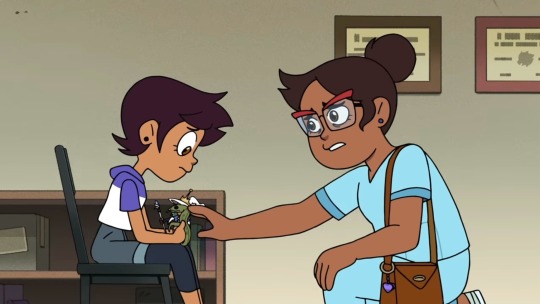
Luz sees herself as the Problem Child, she’s cursed to destroy everything she touches, her presence invites chaos and issues. That’s how she was seen in Gravesfield, and she’s very much a disruptor to the status quo, befitting her out-of-context status, her unpredictable creativity, her penchant for rebellion, her drive to try and find out, etc. And while it ultimately leads to good, the road there is tumultuous, it could’ve been done better, Luz causes problems. For Luz it’s not as emphasized, but she doesn’t want to be seen as weak, because she fears being seen as a burden.
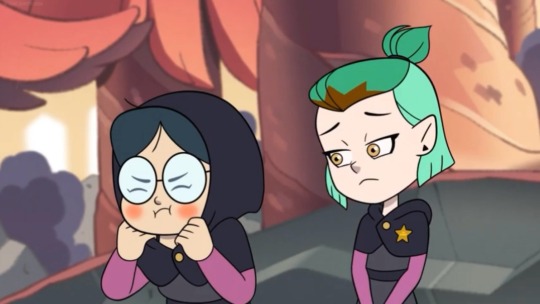
Willow doesn’t see herself as effective, at the start of her arc and near the end of it; She can’t do anything right. She’s not even causing chaos or anything, there’s just nothing remarkable about her, nothing she can accomplish. In her introductory scene, Amity tries to “joke” over how easy it is to miss Willow, she’s a wall flower who’s trying not to be seen as she hides in her hood, and she tries not to see things that bother her, hence “Out of sight, out of mind.” Stay in your lane and don't attempt what you want.
Boscha bullies her, not because Willow did anything to affect her (Not yet anyway), but just because she happened to notice and find Willow’s ineffectual, pointless existence hilarious. Maybe she wanted to possessively defend Amity from someone who had her first, while ignoring that Amity already –seemingly– left Willow for her, because she’s inherently insecure and paranoid like that. Both can be true, and one of them definitely is.
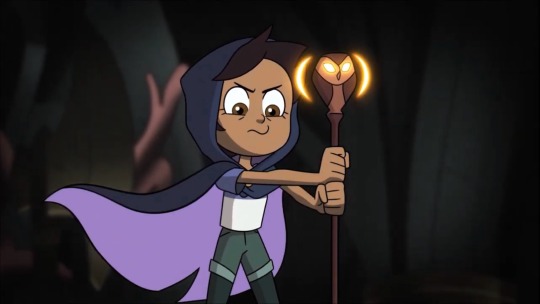
Luz is chaotic, she’s good at causing a mess, and she can and will weaponize that against people like Belos at the end of seasons 1 and 2; Sometimes sabotaging an enemy is necessary to help the rest! But as we see in S2, Luz’s mistakes ultimately culminate in what she sees as her greatest mistake, the one with the biggest impact of all, something that would harm everyone she’s ever met in the isles, including Willow; So Luz sees herself as a ticking, dangerous time bomb. And it’s why she resolves to stay in the human realm at the start of S3; She pushes people away because she also thinks she hurts them, and their desire to stay is a self-destructive mistake.

Whereas in S2, we see Willow begin to build up her confidence; She realizes she IS capable, she’s quite strong and effective. She’s nurturing, she can defend people, she can even lead them as a team captain that others look to for strategy! Where Luz and Amity fail (the former being a surprise given her track record), it’s Willow who gets Hunter to defy the coven for someone he’s met.
She beats Hermonculus at his own literal game, and Hermonculus is established in Willow’s debut as one of the driving forces behind Willow’s ostracizing by her fellow students by emphasizing how ineffective she is to everyone, inviting them to notice and laugh at her; He’s arguably the true antagonist of Willow’s debut episode, with Amity just another pawn pitted against a fellow student, so seeing it come full-circle was catharsis. And this is after defeating Boscha at her own also literal game!

Between this and finally, truly reiterating to Amity something she’s never understood since their childhood, since their debut –that Willow is effective and good at helping– you can see Willow affirm her belief that she’s dependable. That she’s helpful. Even, that some people need her, like Hunter, or Amity coming to her for advice, or Willow uplifting Gus as his first friend, etc. All the while, Luz is coming to the ‘realization’ that she’s the opposite. S2B is Luz at her most damaging, S2B is Willow at her most capable.
So you have the backdrop in S3 of Luz thinking she can’t help people at all, and Willow believing she’s very helpful. And both of them want and believe in the same thing; To be helpful to others. And thus they both fear being a burden by asking for help. For Luz, this is just the natural extension of her destiny as the Problem Child. For Willow, it’s just a reminder of the ineffective person she used to be, her traumatic past. Luz thinks she never escaped her identity, Willow believes she has but is so afraid of going back to that.
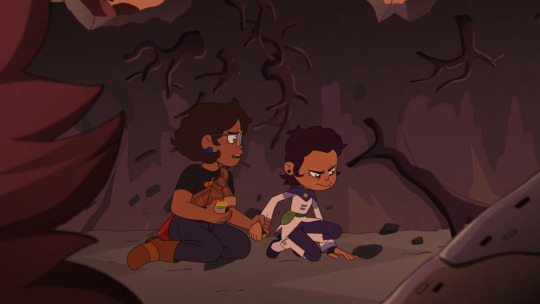
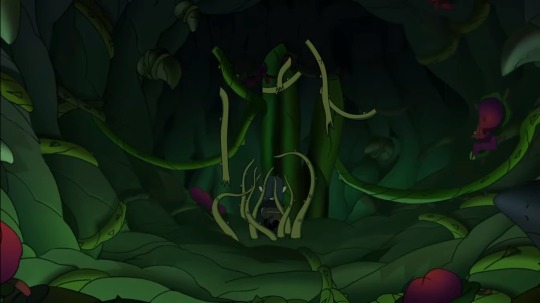
In their mutual climax, Luz believes she’s the root cause of the problem, Willow thinks she’s the solution that’s failing to be a solution; Flapjack died and Hunter is in a lot of pain because of Luz, Willow isn’t able to make him feel better. This whole situation with Kikimora using the threat of the Collector to become someone in power and a threat is Luz’s fault to begin with; Meanwhile Willow is reminded by Boscha that she’s someone people are counting on to get them out of here; Boscha is like Willow here, she feels pressured to protect Hexside from the Collector, who is a lot like Luz, down to imitating her intentionally.
So again, they have the same wants, just coming from different presumptions of how close they actually are to these things, and neither’s anxiety is more or less valid than the other’s just because one sees herself as more capable now and the other doesn’t. Camila reiterates to Luz that mistakes are just a part of life she can’t keep blaming herself for, while Hunter reassures Willow that she didn’t do anything wrong. Camila and Hunter admit they made their loved one feel ineffectual in some way.
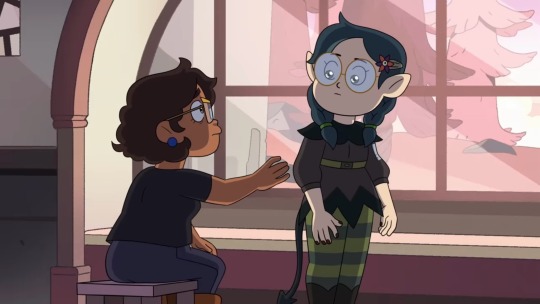
And the epitome of this is that Luz and Willow are the ones who need to hear this, Camila and Hunter are the ones who need to say it… Yet it’s Camila who goes to Willow for advice, who has an interaction with her early in the episode, a different kind of parallel; Because they parallel one another as people who see themselves as in charge, as the ones who are responsible, as the “motherly” (quotations for Willow) nurturing figure.
And Luz and Hunter’s parallels are self-explanatory, per the prior episode and trauma bonding over guilt on something they can’t control, actually making each other worse, plus feeling responsible for Flapjack’s death. So it’s this cross-section of parallels and foils, and it’s where all four culminate, before Luz moves on to cap off the show because it’s ultimately her own.
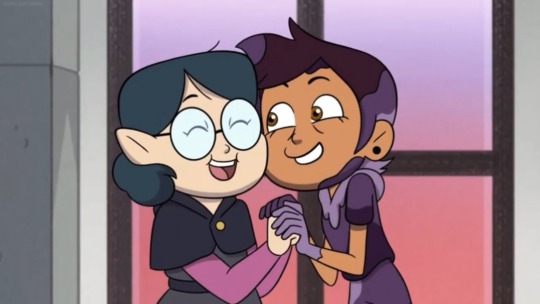
Just. Something about how Willow is the first friend Luz makes outside of the core LEK trio, and the first main cast member in that regard. They’re both kids struggling over different yet dismissed and even mocked reputations at school. And their arcs both converge, with Willow’s arc essentially the final one outside of LEK bookending everything in the finale with the Collector, who is also explicitly Luz, and their journey comes to an end from him and the viewer understanding Luz’s.
44 notes
·
View notes
Text
These are the tech bros dismantling democracy in America at the behest of unelected Elon Musk. Basically a bunch of spoiled rich brats.
Elon Musk’s team of young DOGE disruptors have been unmasked, much to the ire of the billionaire and other MAGA figures. One is a 19-year-old college freshman and heir to a popcorn fortune. Another was hosting Model UN sessions in 2019 and a third was given money by his parents to invest in stocks while at his high school in Silicon Valley. [ ... ] Musk’s team of youngsters, as first reported by WIRED on Sunday, is Akash Bobba, 21, a student at the University of California, Berkeley; Edward Coristine, 19, a student at Northeastern University in Boston; and Ethan Shaotran, 22, who said in September he was a senior at Harvard. The ones who actually have degrees, or at least have left college, are: Luke Farritor, 23, who attended the University of Nebraska without graduating; Gautier Cole Killian, a 24-year-old who attended McGill University; and Gavin Kliger, a 25-year-old who attended Berkeley; The group’s relative lack of experience—especially no previous positions in government work—has Democrats crying foul they were granted access to sensitive records while remaining largely in the shadows, away from public scrutiny. All six desperately tried to cover their digital tracks recently, almost all of them deleting LinkedIn profiles, X accounts and even Facebook.
The most peculiar one, Gavin Kliger, is a Matt Gaetz groupie.
But what Kliger really wants the world to know about is his belief in male MAGA warriors Matt Gaetz and Pete Hegseth’s brilliance, using his Substack to post about them both. Gaetz, who was investigated over allegations of teenage sex trafficking, was, according to Kliger, a victim of “the deep state.” Hegseth, a serially unfaithful former Fox News star accused of sexual assault, drunkenness, and receiving lap dances while in uniform, was, he wrote “the warrior Washington doesn’t want but desperately need.” Kliger, whose Cornell graduate father is an attorney for Experian, appears happy to monetize his DOGE experience: he has made the entry about DOGE on his Substack for $12-a-month subscribers only.
Kliger even looks like an aspiring Matt Gaetz. Maybe he'll use the fees from his Substack to finance Gaetz-style cosmetic surgery.

^^^ The "Gaetz gaze"
Here they are, The Elon Youth. Rich boys engineering the destruction of your future.
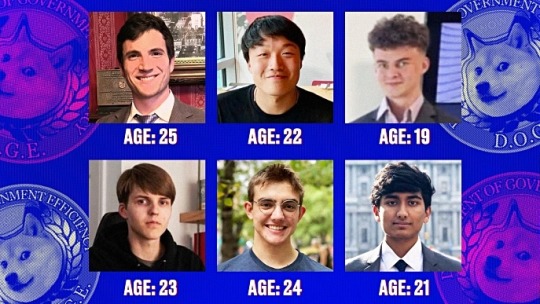
#transparency#elon musk#the elon youth#doge#destroying the us government#gautier cole killian#gavin kliger#luke farritor#akash bobba#edward coristine#ethan shaotran#maga#donald trump
36 notes
·
View notes
Note
I mean it might just be more people coming into leftist spaces without unlearning deeper biases and stuff, but I did a cursory google on it and I’m fairly sure american reading comprehension in schools has been recorded going down, and covid might’ve been a large enough social disruptor for enough people worldwide that it might have something to do with it? But there’s also the chance it might just be the fact that a lot of people tend to discover more unsavory stuff (because they discover more stuff) as time goes on and they chalk this up to being things getting worse rather than those things just not being seen
the type of reading comprehension that is in crisis is not the undergrad-literary-analysis type but the fundamental 'being able to read words' type, and that's mostly because of really flawed teaching methods. it's a very different type of 'reading comprehension' to the type that people are complaining about when someone, like, doesn't get the point of fight club.
141 notes
·
View notes
Text
When you have trudged unwilling far enough down the road of desperation, you might spy a crooked little path leading off into the woods signposted ‘opportunity’.
You must be eagle-eyed to spot it. That or you must have friends who will give you crude, hand-drawn map.
So it was in your case. As your savings flatlined and the financial doctors behind their plaguemasks stopped even returning your calls, a friend passed on a business card.
It was good money, they assured you. Very legit. Referral only. An exclusive service.
If anything, the ‘exclusive’ nature of it was what stopped you from getting in touch. You were fairly sure you weren’t *deserving* of an elite get-out-of-money-jail free club.
But eventually, you got far enough down the road that you knew this was your only exit. It was this or enter the Bankruptcy Games.
You made the call.
---
“So, you’re a temp agency?”
“*The* Temp Agency, in fact.” Said the suit with a face. “It’s a great deal. You come to work, you close your eyes, and you wake 8 hours later and 8 hours older. It’s like being paid to sleep, only without the rest.”
“But if I’m not doing anything, what are you paying me for?”
“For your time, of course. There’s always a market for it.” The suit with a face smiled the *idea* of a smile which contained within it the *idea* of sharp canines. “It’s the one true currency. The ‘hour standard’.”
“...I thought procrastination was the thief of time.”
“Procrastination is a moocher who never did anything for you, darling. We offer a 401k.”
“I still don’t really know what that is.”
“No-one does. But, believe me, you want one.”
---
After your first few visits, you began to get some faint ideas of how the enterprise worked. When you got into the slim glass pod, you noticed the telltale whine of a consciousness disruptor. You’d used them in work once, before you caught ethics.
So … the time was not simply siphoned out of you, There was a *process* that required you to be un-awake.
The next visit, you asked an old friend for a 3D bug. It was all organic neuron circuitry in a collagen case - slipped beneath the dermis, it was virtually undetectable.
When you played back the recording, you saw the strangest scene.
After you were rendered unconscious, face-in-the-suit opened a small hatch and a crowd of tiny 8-inch humanoids thronged through. They knelt in front of your pod and began *praying*. They praised your name, begged intercession, then praised your name some more.
They had made a god of you - a strange kind of chrono-theology.
Only your followers did not ask you to give them their daily bread, but simply to give them *days*.
#writing#flash fiction#microfiction#short story#puns#sci fi#speculative#writeblr#wtwcommunity#writers on tumblr#capitalism
61 notes
·
View notes
Text
Wait til you see what's coming. The rule of law is important. They must learn We the People won't sit for a Traitor in our White House. Getting meanful legislation requires the GOP crossing over and voting for good legislation... but this requires motivation. How do we make them more afraid of us and willing to obey than they are of redhatted gun nuts... because fear is now their big motivator. They have no shame or civic pride... they have no morals or ethics anymore. What we have to use is the same weapon MAGA uses. Fear. They must become more afraid of us than of Qnutmaga... that fear must compel obedience to the rule of law. That chance was lost when Garland punted and didnt treat their coup as a severe national security threat... they were fearful once Trump met his fate, they were next... It won't be lost now if we act decisively and show the GOP what their treason cost them. They must fear. That and money are their motivators. Look carefully at their interactions. They are afraid of the monster they created and unleashed... now others are trying for a slice of the Maga pie as Trumps dementia enters its final stages, Flynn... Gabbard... Bannon... and others. We need to manipulate their fear and make them realize it's better to be in our thrall than Trumps. We don't need a Bernie Sanders... we need a Bruce Wayne.... criminals and domestic enemies are a superstitious and cowardly lot. We can use this to our advantage... always fact check and publicly correct their lies and gaslighting. Put links to the actual truth where practical. Never allow them to draw you into a squabble or insult you... treat them recalcitrant children they resemble. "You missed the point yet again... let's review...(redo info or post)" "Still missing the point... let's review again." "The public record is very much against you I'm afraid... that conspiracy theory is long debunked... Gaslight better..." " In fact this debunks your whole conspiracy theory...(link)..." they will hate being checked. Bullies want you to respond their way... respond like a teacher or governess... steady, firm, unflappableand ready to review again. Trumpers usually block me after a few rounds of this... or just give up and don't respond. Be the the truthful thorn in their side. They fear the truth. They fear people know the truth and think less of them. Bullies hate folks that stand up to them... especially en masse. Look at Trump for an example...
#fuck trump#maga morons#fuck maga#maga cult#traitor trump#republican assholes#republican cheats#trump is an idiot and so are his voters#fuck the gop#inbred
10 notes
·
View notes
Text
Episode 2 - Do not open.
📼📼📼📼📼📼📼📼📼📼📼📼📼📼📼📼📼📼
The set up for this recording involved Jonathan clearing his desk of every potential disruptor. His notebooks were neatly chauffeured into piles, his pens neatly tucked into his blazer pocket.
Even then, he carried himself tentatively. I don’t know if he knew – at least on some subconscious level – what he was getting himself into, or if he was just scared. He spoke with an air of confidence but we both silently acknowledged the falsehood of it all.
He began as he would continue to for years to come.
“Statement begins”, he said. Cynicism lacing his inhale. Pure investment as he read. It was funny, then, that he identified himself as ‘Head Archivist’. I suppose at the time that’s all he was. That’s all he knew. Do my job, respect my promotion, go home. It’s a pity Elias never let on how truly deep this job goes. Maybe Jon would have run if he knew. He probably would have tried.
I vividly remember the recording of this statement. I remember wanting to laugh at the way Joshua tried to hide the extent of his inebriation. A youth’s life. Ah, the freedom they hold between their very fingers. The horrors of aging far ahead of them.
The reality of monsters creeping ever closer.
I couldn’t tell you how aware Jon was as he read. His eyes locked onto the words with sniper precision. The words passing his lips like they’d been waiting centuries for their release. He only looked at me at the end, when the spell wore off and his defensiveness sprang back to the forefront of his mind. The way he raced to dismiss any aspect he couldn’t physically prove always left me uneasy. Perhaps I had the hindsight to know better. Perhaps I was already jaded from decades of statements on monsters and mysteries. Maybe I simply knew that man was to become just another statistic.
Do not open. A simple instruction. Joshua had a surprising number of brains, I thought. To avoid disobeying direct, succinct instructions carved into a coffin on mystery origin. Especially when it began to sing. I know a shamefully large collection of people who would do the very opposite. Human nature, I suppose.
He was admirably creative, too. To resist accidentally unleashing God knows what but making it too damn inconvenient. Freezing a key so that even possession couldn’t overcome the raw effort needed to open the box.
The old adage rang particularly true for me that evening. ‘Good things come to those who wait’. A good enough thing came to Joshua Gillespie when he had the good sense to wait out his coffin. Anything can blend into the background if you long deeply enough for normality.
I was grateful Jon shared a fact about himself, even if just in passing. Even if he didn’t know I could hear. Understanding where he can from felt like the beginnings of the bond for us. At least, I like to see it that way.
The future watcher connecting to his eternally ceaseless listener.
📼📼📼📼📼📼📼📼📼📼📼📼📼📼📼📼📼📼
#help i kind of hate it#the magnus archives#tma rp#tma rp blog#tma#tape recorder#jonathan sims#ask me anything#ask#roleplay#fanficton#do not open#mag02#new pov#i hope you guys like it#should I have made it longer?
11 notes
·
View notes
Text
((Ouh… so a little bit ago, I got onto thinking about Bloxston mystery and Pressure, so …. heres what I think everyone’s roles would be. All-any match logic, ofc!
Eyefest - Okay so like. It would be funny to say she’d be Lookout, but… Eyefest feels like she belongs in a more mobile role, like bounty hunter or bodyguard or something
Lady Death - Although retributionist, necromancer or medium are def a more fitting role lore wise, as those are the only few roles to deal with the dead, I honestly think she gives of Jailor vibes- She totally seems like the kinda gal who’d show up and start questioning you in the middle of the night- Jailors are typically the calmest of the bunch too, so like. yea
Guardian Angel - Well. That choice is obvious….. Guardian Angel! But if it weren't for the fact that GA is literally a role, probably Liberator. Given their whole “protecting the banlands and their family from hackers” thing, I can totally see them as the very role that goes out at night with a sword to protect the town.
Fluffball - Hm. Toughie. Possibblllyyy…. Distractor. Or spy. Either or, really- Regardless, Fluffball could probably be sent out to intercept others in their path, either to distract of retain information via a recording device-
Navi - Mmmm. Honestly? Consigliere. Shes got a shitton of information in her system, and she used to be part of Urbanshade, so….
Painter - Spy or lookout. With the systems he usurped from Navi, and the access to cams, they could totally catch people in The Act™️
Rach - Potion Master…. Purple role title, the whole bartender who makes drinks = potions thing… fitting enough, I do think
Lopee - Probably a retired mafioso, ngl. Just ‘cause the dude used to be close to Shade
Sebastian - ……..fugitive
Scott - I honestly want to say Toxicologist JUST for the sake of being means to him. Now someone put him in the Miserable Guy Salad Spinner for ten billion jillion years /lh /j
Tanner - JESTER
Mx - Either Amnesiac (Ayyee, thats my name!) or Disruptor, given the fact that it constantly changes, and or because its constantly everywhere. Or on second thought, maybe even Conjurer…. hm…
Was gonna list Andie, Marie and Azure, but. Imma be honest I dont know them well enough to pinpoint what roles they'd be, so- That's. On hold for now
8 notes
·
View notes
Text
More problems for Miles: now an spillage, which is a step above sewers, I think. Oh. Mutagenic spillage. Steps below. Definitely below.
So a day in Barrayar is 26,7 hours! I was wondering about that, I think i read Ivan mentioning hour 25 before.
Have I already said I don't like Metzov? I don't like Metzov.
WOW THIS IS ESCALATING QUICKLY. NOW MILES HAS A NERVE DISRUPTOR. OKAY. OKAY. YEAH WE CAN DO THAT.
NO CLOTHES IN THE POLE. OKAY. YEAH WE CAN DO THAT. I know Miles doesn't die here, which is little relief.
"It'll all look different in the morning, anyway." "Yeah. Worse."
This dialogue was so funny!
“Imperial security” Oh, that is good :D “Miles is happy about that”. Oh, that is not good :/
HIGH TREASON?! AGAIN?! He's 20!!! I wonder if he'll set a record, at this rate. "Most high treasons per year".
At least he won't be cold in Vorbarr Sultana...
Illyan! Long time no see! You were younger last I read about you. Was he in "Barrayar"? I recall him in Shards of Honor...
Offhand, Miles knew of no one Illyan feared except Miles's mother. He'd once asked his father if this was guilt, about the soltoxin, but Count Vorkosigan had replied, No, it was only the lasting effect of vivid first impressions.
I see he recalls Shards of Honor as well. Well, he recalls everything, I guess.
"Him". Ay, Aral… OH HES HERE! THE MAN, THE MYTH, THE LEGEND
Jole??? Is this the Jole I've read so much about in the main tags?? Gentleman Jole and the Red Queen’s Jole? I didn't know he'd be here that early. Then again I also expected Bothari to last a couple more books. It feels unreal that I'm already in book 4.
Aral hugs Miles, peace and love on planet earth
"For that sin, there is no hole deep enough to hide him from my wrath." hbcffhh i love Aral. Though what are you gonna do? Send him to Kyril Island?
MILES RENOUNCING HIS CAREER?!? THAT HE FOUGHT SO HARD TO GET. Excuse me while I go cry in a corner.
26 notes
·
View notes
Note
wait im kinda new the 3k fandom, is half of it actual history and the other half just… homoerotic relationships with right-hand-mans?
first of all, welcome aboard! tldr: if your historical RPF doesn't ruin a politician's reputation for the next 800 years, are you even doing it right? yes Romance of the Three Kingdoms is based on actual history! it's set in the early 3rd century Han Dyansty (around 200 CE), during a bloody on-and-off civil war called the Three Kingdoms Period. The novel itself was written in the 14th century, nearly 1100 years after it all went down. if you disregard (most) of the supernatural elements, the story is fairly accurate, around 3 parts fiction and 7 parts fact. The novel was based on a compilation of historical records called the Records of the Three Kingdoms.
I must apologise on behalf of me and the mutuals for giving you a skewed impression of the homo. Sadly 3k is about 70% history, 25% socio-political allegory and only 5% Manly Love Between the Liege and His Vassal. Homoeroticism-Cao who was defeated at Red Cliffs and pines after the enemy general every sichen was an outlier and should not have been counted. that's on us.
the 3k novel was written during a time of civil unrest and a crises of national identity. during the Yuan dynasty parts of China were taken over by the Mongols, which eventually collapsed and gave way to the Ming. the author Luo Guanzhong lived during the late Yuan-early Ming period, he saw himself as an intelligent and capable man who never managed to find a worthy liege or a great cause to serve, in the end he became disillusioned and sunk to the lowest possible depths for a gentleman-scholar; writing novels (gasp!). the novel is only attributed to him because it was published anonymously, but it fits his MO. for example, Liu Bei's civil advisor/PM Zhuge Liang was changed so much he basically became the author's self-insert; he is a scholar-recluse who finds a worthy, benevolent master and then devotes his entire life to fulfilling his dreams of unifying the country. and also he's a military genius who single-handedly defeated cao cao and then everyone clapped.
This was also where a lot of revisionism became codified. Prior to this, Cao Cao was considered the real hero of the story, especially by the educated elite. His empire was also succeeded by the Jin Dynasty, so of course they needed to legitimise him. Liu Bei was seen as an opportunist and a disruptor, though he was always beloved by the common people who related to his struggles and were touched by his (seemingly genuine) kindness to them. The big change happened because after the Mongol invasion, the Yuan was split in two, the official dynasty submitted to Mongol rule. The other part saw themselves as the underdogs and righteous rebels, just like Liu Bei standing up to Big Bad Cao Cao.
Prior to this, 3k mainly existed in the form of folktales with different interpretations, and LGZ was the first person to create a single, unified narrative out of it. there's really cute accounts of contemporaries in different dynasties being all "idgi? all the kids boo when cao cao shows up, but they cheer when liu bei wins, and cries when he loses." truely a Blorbo of the people.
27 notes
·
View notes